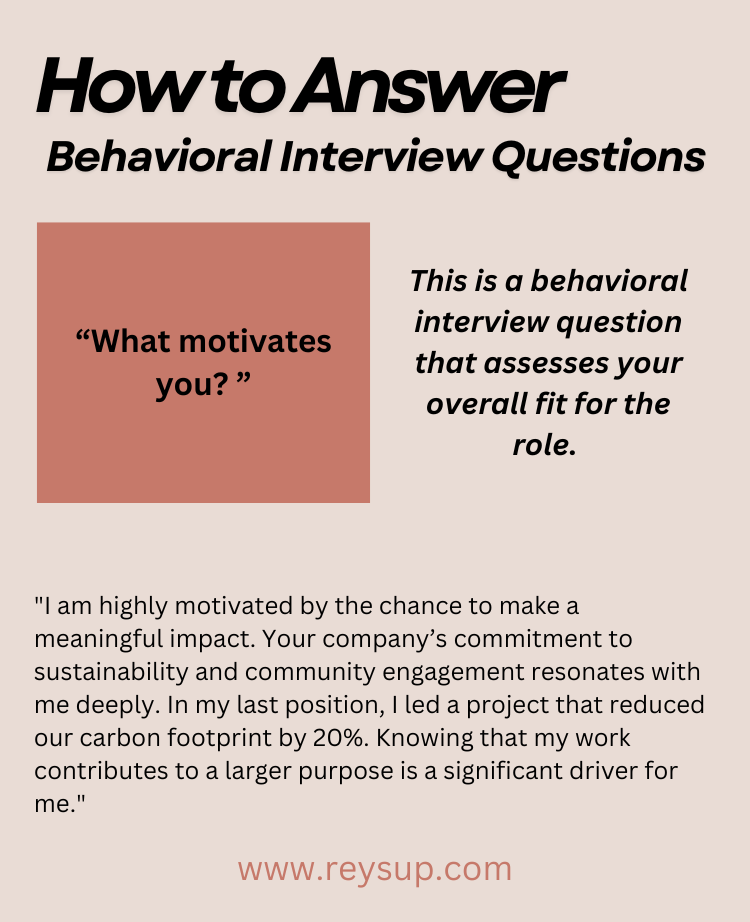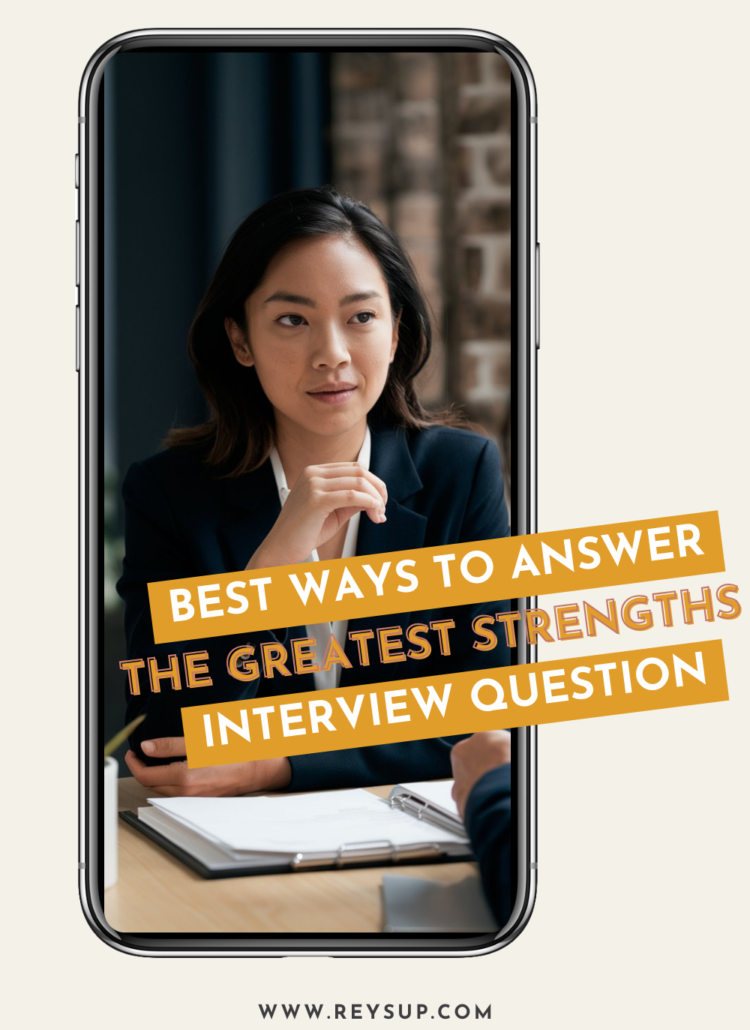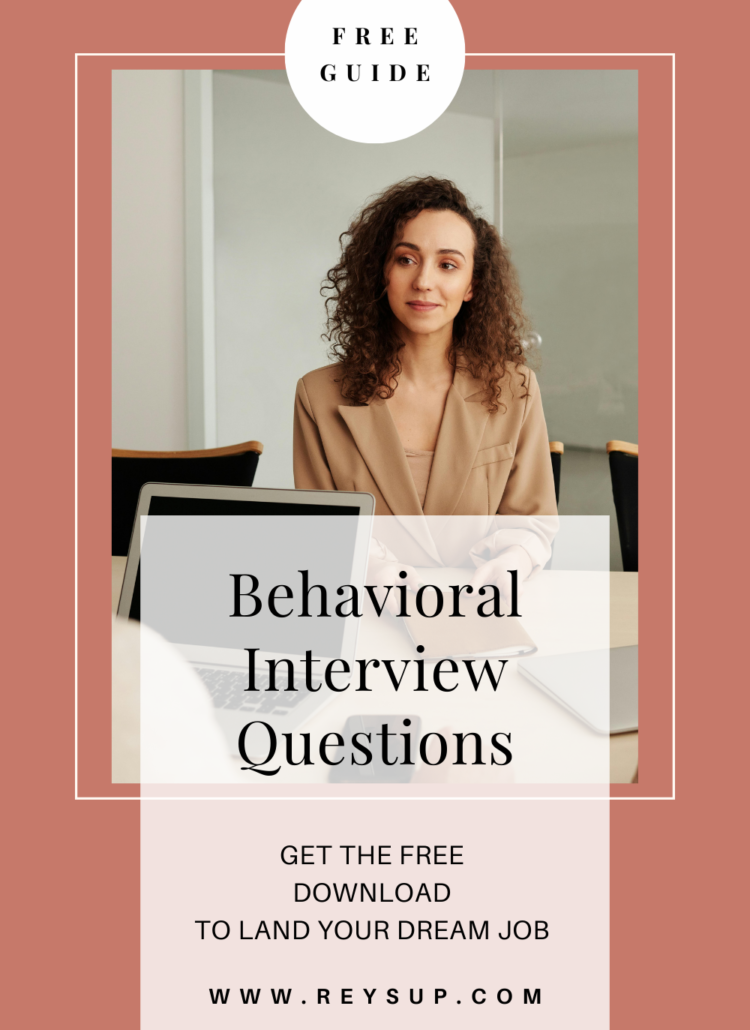In this article we explain how you can master the key interview question “What Motivates You”, so you can answer with confidence to land the job.
Interviews are a crucial step in the hiring process, allowing employers to assess your fit for not just the role, but the company culture. Of the many interview questions asked, “What motivates you?” is a questions that is asked a lot. This question really allows an interviewer to dive into who that candidate is when it comes to their drive and over compatibility with the role and the company. This question is incredibly loaded and answering it is a combination of an art and science. Have no fear. The team here at ReysUp knows exactly how to address this question so you can land your dream job. Keep reading to learn how to approach the interview question “What motivates you”, and how to formulate a response that will leave a long lasting impression on your future employer.

Understanding the ‘What Motivates You?’ Question
When an interviewer asks, “What motivates you?” they are trying to peel back the layers of the onion and get to know you. This is very similar to the strengths and weaknesses questions in terms of intent, but employers are looking for more than just a straight forward answer.
By asking this question, employers want to understand the following :
- What are your intrinsic and extrinsic motivations? Are you driven by completing projects, challenging yourself to be better or do you need to be praised or complimented internal satisfaction or external rewards?
- Are you aligned with the company’s goals? Part of asking this questions is to assess if you are an overall fit with the organization. If you are motivated by building something from 0-100 then working in consulting is probably not for you.
- Do you have the work ethic and passion the employer is looking for? During challenging times, what keeps you passionate about the work you are doing and what keeps you motivated to get up and go to work every morning.
Crafting Your ‘What Motivates You?’ Answer
In order to effectively answer the question, you need to dedicate time to self reflection, tailoring your response, being specific and authentic, and including a combination or internal and external motivations.
1. Self-Reflection
Before the interview, take some time to reflect. Think about on what genuinely drives you and think about what’s encouraged you in the past. Consider the following:
- Past experiences: Reflect on roles you’ve been in, project you’ve worked on or even tasks that you found fulfilling. What activities do you love doing and what activities do you hate doing?
- Career goals: Where do you want to be in 5 to 10 years? What are your ambitions? Taking the time to understand what you want can help you better understand what motivates you?
- Personal values: What do you believe in and what do you stand for? For example, if you are a vegetarian, you probably don’t want to work for Purdue.
Write all this down into bullets or in a google doc. When you are done, go to your favorite AI tool and ask them to pull out key themes. This will allow you to begin to understand what you really enjoy doing, and you can tie that into your response. More on this in the next section.
2. Tailor Your Response
Customize your answer to fit not just the role but the company as well. Research the company and understand who they are and their values. Make sure that aligns with who you area and their values. This is the perfect time to highlight the job description and key traits. You can also go to the company’s career page and generally they have a “Mission, Values, and What Drives Us” page or something similar. Understanding what the hiring manager and company care about is essential. You can also do a bit of looking at the interviewer on LinkedIn or even facebook/instagram to find out what they care for.
3. Be Specific and Authentic
Avoid vague, pie in the sky answers. Again, the purpose of this question is for interviewer to get to know you. Share examples of what truly motivates you and influences you to be better. Remember, authenticity is key; interviewers are smart and they can instantly sniff out if you are telling them what they want to hear. Use your list and the themes you gathered from your self reflections to inform your response.
4. Balance Intrinsic and Extrinsic Motivations
While intrinsic motivations (e.g., personal growth, passion for the work) are often more appealing, don’t shy away from mentioning extrinsic motivators (e.g., financial rewards, recognition) if they are relevant. The key is to show a balanced perspective, and also share what really matters to YOU. While answering this question properly is important. You also need to make sure the role is really for you if you want to set yourself up for long term success.
How to Answer “What Motivates You?”

Also Check Top 20 Situational Job Interview Questions and How to Answer Them
Example 1: Intrinsic Motivation Focus
Reminder to leverage the STAR method. More on that in our 52 behavorial interview questions article and in our STAR method article.
“One of my primary motivations is the opportunity to continuously learn and grow.
- Situation: In my previous role as a software developer, the team needed to implement a new feature that required knowledge of a programming language none of us had used before.
- Task: I volunteered to lead the project and learn the new language, recognizing that it was a chance to expand my skill set and contribute to an important company initiative.
- Action: I dedicated extra hours to studying the language, attended workshops, and sought mentorship from experienced colleagues. I also organized knowledge-sharing sessions with the team to ensure we all grew together.
- Result: Not only did we successfully implement the feature ahead of schedule, but my newfound expertise in the language also allowed us to streamline future projects. This experience was incredibly rewarding because it highlighted how continuous learning and overcoming challenges are core drivers for me.”
Why this is a good answer
This answer is effective because it follows the STAR method to provide a structured and detailed response that clearly illustrates the candidate’s intrinsic motivation for continuous learning and growth. By outlining using the S.T.A.R. method, you demonstrate a proactive approach and strong work ethic. This example not only highlights their technical skills and ability to overcome challenges but also emphasizes their commitment to personal and professional development, making them a valuable asset to any team.
Example 2: Alignment with Company Values
“I am highly motivated by the chance to make a meaningful impact. Your company’s commitment to sustainability and community engagement resonates with me deeply. In my last position, I led a project that reduced our carbon footprint by 20%. Knowing that my work contributes to a larger purpose is a significant driver for me.”
Why this is a good answer:
This answer clearly states the candidate’s primary motivation—making a meaningful impact—and aligns it with the company’s values of sustainability and community engagement. The inclusion of a specific, quantifiable achievement adds credibility and showcases the candidate’s ability to deliver tangible results. Expressing a personal connection to the work highlights passion and commitment, indicating that the candidate is likely to remain motivated and productive in the role.
Example 3: Balancing Intrinsic and Extrinsic Motivations
“I am driven by both personal growth and recognition for my efforts. In my previous sales role, I was motivated by the challenge of exceeding targets and the recognition that came with being the top performer. At the same time, I found immense satisfaction in building relationships with clients and understanding their needs. This balance of personal achievement and external validation keeps me motivated.”
Why this is a good answer:
This answer presents a balanced view of intrinsic and extrinsic motivations, showing a well-rounded approach. By mentioning personal growth and recognition, the candidate demonstrates a commitment to continuous improvement and high performance. Emphasizing the satisfaction derived from helping clients indicates a customer-centric approach. This balance suggests that the candidate is motivated, dedicated, and likely to sustain high levels of engagement and productivity.
Conclusion
In conclusion, answering the “What motivates you?” question effectively requires introspection, alignment with the company’s values, and authenticity. By reflecting on your true motivators and tailoring your response to fit the role and company, you can provide a compelling answer that highlights your suitability for the position. Remember, the goal is to demonstrate that your motivations align with the company’s objectives and that you have the drive to contribute meaningfully to their success.




